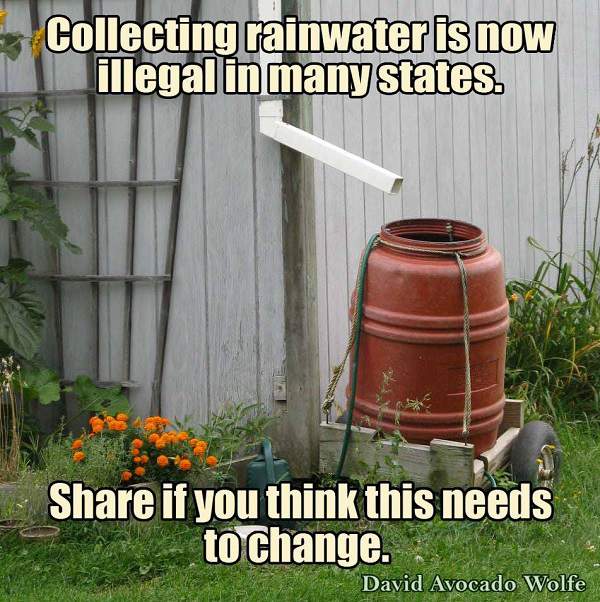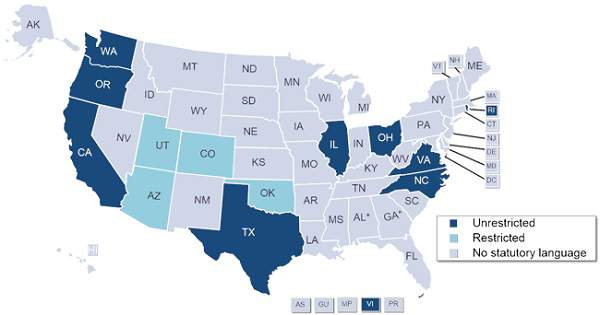I saw this meme show up on my Facebook feed the other day and thought to myself, “Yup, I’m sure it is!”

And so I decided to look for myself wondering which states were being more and more ridiculous these days about restricting our ability to do what we want with our water.
What I found seemed to be the opposite. It seems that states are being less restrictive on the topic! Here’s a current map of state laws regarding rainwater harvesting:

According to the National Conference of State Legislatures page on Rainwater Harvesting, there are four states (Colorado, Arizona, Utah, and Oklahoma) which have laws restricting rainwater harvesting for some reason or another whereas another several states actually have laws on the books that do not place restrictions on rainwater harvesting but do require some formal permit or similar. Finally, the vast majority of states actually say nothing on the matter which is how it should be.
Why Restrict Rainwater Collection?
According to the NCSL.org page cited above:
“State water law and concerns about quality may present a barrier to this policy option. In some states, especially in the West, water law directs that rainfall belongs to existing water-rights owners, and it must flow to its rightful water drainage. In other states, legislators must ensure water quality standards and public health concerns are met when considering rainwater harvesting legislation.”
In my opinion, about the only possible legitimate reason to restrict a person’s ability to collect rainwater is to keep them from doing something stupid with it like consuming the water directly without first treating it. Because, let’s face it, people WILL do dumb things when left to their own devices but, then again, this would “thin the herd” a bit. 😉
The idea, however, that water falling from the sky onto my land somehow belongs to the state in order to fill reservoirs due to “senior water rights” is taking things too far; In fact, a Colorado study found that most of the rainwater doesn’t ever make it to a steam no less (from NCSL.org page):
“In the past, the collection of rainwater for beneficial use was recognized as a potential injury to senior water rights, and, therefore was historically prohibited in the state. However, a 2007 study conducted by the Colorado Water Conservation Board and Douglas County determined only 3 percent of rain actually reached a stream or the ground.”
I’d say that’s reason enough to say senior water rights is a load of B.S. and, besides, what little water a person may be collecting compared to the vast amount of land out there has to be a small “drop in the bucket” of the rainfall anyway. It’s a silly argument to say the least.
States Who Promote Rainwater Harvesting
There are actually some states who are encouraging people to collect rainwater, most notably Texas, Ohio, and Oklahoma… even Colorado is apparently changing their opinion on the matter (from Rainsaucers.com):
“Some worry that regulation means severe restriction. But that is not the case either. For some states, it can mean the reverse. In other words, the State is promoting the practice. Texas, for example, offers a sales tax exemption on the purchase of rainwater harvesting equipment. Meanwhile Oklahoma recently passed the “Water for 2060 Act” which initiates grants for information campaigns on capturing and using harvested rainwater. Even in Colorado where RWH actually was illegal until 2009, residential property owners are now allowed to collect rainwater. Colorado recently authorized 10 pilot projects where captured precipitation was used in new real estate developments for non-potable uses.”
Again, most states say nothing on the issue. Those that do allow rainwater harvesting but also have laws on their books about it most likely require permits or registration. Moreover, these permits are likely only a concern for folks doing things on a big scale and not for somebody trying to water their garden with a few 55-gallon drums, but that’s just my take on the issue… it’s best to find out for sure.
A few folks have done some serious digging in recent years and they’re found pretty much the same. Dave at Enlight-inc.com has done some extensive research and found:
“As of March 22, 2014; after hours of ongoing research for the past year, I have checked all 50 state government websites and found that, with the exception of Colorado and Nevada, there is currently no state government law in the U.S. that considers rainwater harvesting by individuals (home owners) in a direct manor and bluntly, “against the law” for anyone and everyone and furthermore, “government” is not becoming “more restrictive with rain water harvesting”– yet; but it may happen in the future.”
Similarly, the folks at HarvestH2O.com found:
“The only state with major restrictions today is Colorado. Every other state allows rainwater capture; although some require permitting or registration.”
You might also be interested in HarvestH2O.com’s state-by-state summary of regulations regarding rainwater harvesting so you can check your own state’s rules.
Ultimately, while I’d prefer the government stay out of my business and not regulate such a basic need as water, I think it’s also time we get our facts straight and maybe… just maybe… give a few of our government agencies some kudos for trying to help us do it and do so safely.
Leave a Reply